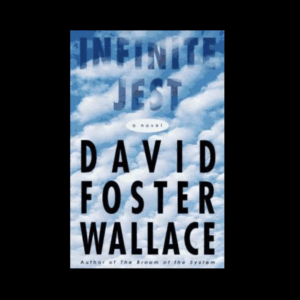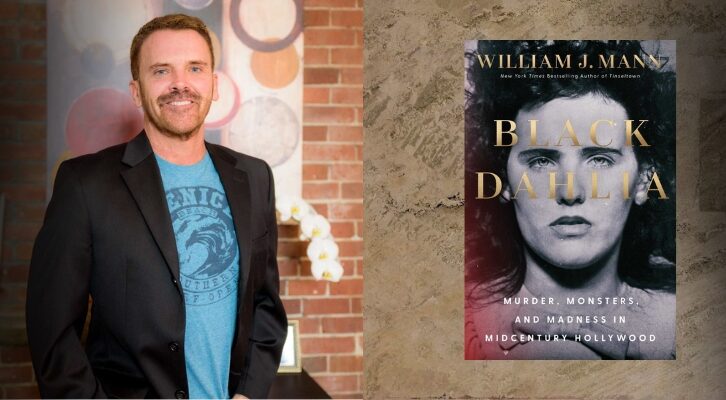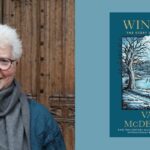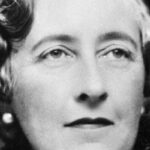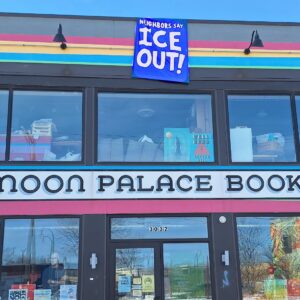
Junot Diaz: On My Way to the Novel, I Fell in Love with the Short Story
In Praise of a Form "Unforgiving as Fuck"
The following is the introduction to The Best American Short Stories 2016.
I’ve spent past 20 years reading and writing short stories—which, given some careers, ain’t all that much, but it is more than half my adult life. I guess you could say I’m one of those true believers. I teach the form every year without fail, and when I’m asked to give a lecture on a literary form (a rarity), the short story is inevitably my craft subject du jour. Even now that my writing is focused entirely on novels, short fiction is still the genre I feel most protective of. The end-of-the-novel bullshit that erupts with measles-like regularity among a certain strain of literary folks doesn’t exercise me as much as when people tell me they never read short stories. At these moments I find myself proselytizing like a madman and I will go as far as to mail favorite collections to the person in question. (For real, I do this.) I hate the endless shade thrown at the short story — whether from publishers or editors or writers who talk the form down, who don’t think it’s practical or sufficiently remunerative—and I always cheer when a story collection takes a prize or becomes a surprise bestseller (rare and getting rarer). I always have at least one story collection on my desk or near my bed for reading—and there’s never a week when I don’t have a story I just read kicking around inside my head.
I am as much in awe of the form’s surpassing beauty as I am bowled over by its extraordinary mutability and generativity. I love the form’s spooky effects, how in contradistinction to the novel, which gains its majesty from its expansiveness, from its size, the short story’s colossal power extends from its brevity and restraint. Or, as Dagoberto Gilb has said, in the story “the small is large, strength is economy, simplicity, not verbosity.” If the novel is our culture’s favored literary form, upon which we heap all our desiccated literary laurels, if the novel is, say, our Jaime Lannister, then the short story is our very own Tyrion: the disdained little brother, the perennial underdog. But what an underdog. Give a short story a dozen pages and it can break hearts bones vanities and cages. And in the right hands there’s more oomph in a gram of short story than in almost any literary form. It’s precisely this exhilarating atomic compound of economy + power that has entranced readers and practitioners alike for generations, and also explains why the story continues to attract our finest writers.
But such power does not come without a price. This is a form that is unforgiving as fuck, and demands from its acolytes unnerving levels of exactitude. A novel, after all, can absorb a whole lot of slackness and slapdash and still kick massive ass, but a short story can unravel over a pair of injudicious sentences. And while novels can dawdle for chapters before sparking into brilliance, the short story needs to be about its business from its opening line. Short stories are acts of bravura, and for a form junkie like me, to read a good one has all the thrill of watching a high-wire act. When the writer pulls it off sentence by sentence scene by scene page after page from first touch to last, you almost forget to breathe.
Novels might be able to summon entire worlds, but few literary forms can match the story at putting a reader in touch with life’s fleeting, inexorable rhythm. It’s the one great benefit of the form’s defining limitation.
Stories, after all, are short, just like our human moments. (We’re all Tyrion, narratively speaking.) Compared to the novel, stories strike like life and end with its merciless abruptness as well. Just as you’re settling into the world of a story, that’s usually when the narrative closes, ejecting you from its embrace, typically forever. With a novel there’s a more generous contact. When you read a novel you know implicitly that it ain’t going to end for a good long while. Characters might die, families might leave their home nations, generations might rise and fall, but the world of the novel, which is its heart, endures . . . as long as there are pages. A novel’s bulk is a respite from life’s implacable uncertainty. You and I can end in a heartbeat, without warning, but no novel ends until that last page is turned. There’s something deeply consoling about that contract the novel makes with its reader.
No such consolation when you read stories. That’s the thing—just as they’re beginning they’re ending. As with stories, so with us. To me this form captures better than any other what it is to be human—the brevity of our moments, the cruel irrevocability when those times places and people we hold the most dear slip through our fingers.
Some friends have told me that their lives resemble novels. That’s super-cool. Mine, alas, never has. Maybe it’s my Caribbean immigrant multiplicity, the incommensurate distances between the worlds I inhabit, but my life has always worked better when understood as a collection of short stories than anything else. Thing is, I’m all these strange pieces that don’t assemble into anything remotely coherent. Hard for me to square that kid in Santo Domingo climbing avocado trees with the teen in Central NJ bringing a gun to school with the man who now writes these words on the campus of MIT. Forget the same narrator—these moments don’t feel like they’re in the same book or even the same genre. Those years when I was running around in the South Bronx, helping my boys drag their congas to their shows—that time feels like it happened to someone else. (That world! These days it’s all been erased and they’ve rolled it up like a scroll and put it away somewhere. Yes, I can touch it with my fingers. But where is it? ) I guess some of us have crossed too many worlds and lived too many lives for unity.
The simple fact was that stories were treated then as they are treated now—like daughters are treated in third-world patriarchies.
Here’s the funny part, though. For all that rah-rah on how super-duper-amazing stories are, I didn’t actually start out wanting to write them. Surprise surprise: I started out like a practical fiction person—wanting to write novels.
Was there some moment when I chose the novel over the short story? Dark Side or Light? Nope. I’m not sure I even thought about it. I chose to be a novelist . . . because that’s just what a normal person did. Didn’t matter that three of my biggest literary heroes at the time—Los Brothers Hernández and Sandra Cisneros—were short story writers. Didn’t matter that in those days Carver was ascendant, that Where I’m Calling From was prominently displayed in every bookstore and on every fiction writer’s shelf. Didn’t even matter that my undergraduate writing professor was a storywriter by trade and a damn good one. I’d heard the rap about how the story wasn’t going to get you shit and swallowed it whole hog. (Didn’t help that when my mentor went up for tenure on the strength of his stories he got denied—no pass go.) The simple fact was that stories were treated then as they are treated now—like daughters are treated in third-world patriarchies—and when you’re a kid who grew up trapped on the margins, the last place you want to be is on the margins. As unthinking as an insect turning toward a flame, I went straight for literature’s big fat brass ring: the novel.
Only problem was I reached my MFA with my Great Dominican Novel still in its “development stage” (a condition from which it never recovered). Since I was obligated to hand in writing for my workshop at a regular clip, my plan was to draft a couple of short stories to cover my ass while I got my novel game up to speed. Bang a few of these bad boys out and by the end of the semester my novel would be up and running and I’d never look back.
Yeah, that was the plan. But you know what they say about plans. Those first September weeks in Ithaca, when a balm seemed to hover over the place and the students still splashed in the gorges, I churned out my first story and handed it in to my workshop. I didn’t expect a lot of problems. To be honest, I was so confident that the story was good that I didn’t give it much thought at all; was more caught up reading about Trujillo and the U.S. invasion of 1965—you know, doing my real work, my novel work. Workshop rolls around and I still remember the feeling on my face as I watched my story get gutted. I’d caught beatdowns before, but this one was a graduate workshop beatdown and I felt those lumps for days. Sure, there was some mild praise about the setting and a few of my lines got checkmarks next to them, but the overwhelming reaction was negative. Even the students of color I felt affinity for were underwhelmed; one of them wrote extensive notes about everything that was wrong with my story. Like, three pages, if I remember. In little type.
All right, a bad first story—that can happen to anyone. It wasn’t like I had plans to be a storywriter anyway, so it would have been easy to switch to the novel and fuck short stories forever. But try as I might I couldn’t quite get over my embarrassment at that first attempt. My own prejudice turning on me. I thought you said stories are bullshit—so why can’t you write one? Pure dumbness—writing good stories don’t make anyone a great novelist and vice versa, but that’s where I was at. (The fact that my peers were turning in excellent short work only added to my burn.)
So after a lot of deliberation, I decided to write another story—mostly to clear the bad taste out of my mouth. (Translation: pride.) But this time I went, as the kids like to say, in. I attacked the form with a fury—like my life depended on it. Started eating breathing shitting short stories. I’ve always had this immigrant’s ability to turn it on in times of trouble, but that first semester at Cornell I didn’t just hit beast mode; I went Super Saiyajin. Not only did I read my peers’ work with a Talmudic intensity, writing up long-ass reports on what they did right, but I began locking myself up at the Olin Library every single morning after my run, with the mandate to read at least a hundred pages of short fiction minimum. I got recommendations from my peers, from my professors, picked up names from the discussions in workshop and from prowling around the stacks and the new arrivals shelf. If there was a short story collection, I pulled it and read it. Didn’t matter who wrote it or if it was any good. I devoured everything.
I’ve always had this immigrant’s ability to turn it on in times of trouble, but that first semester at Cornell I didn’t just hit beast mode; I went Super Saiyajin.
What happened during that intense blaze of reading was that a new aesthetic standard began to establish itself in me. I went from a grudging tolerance of the short story to a surprised admiration.
It dawned on me finally that this was no intermediate form, a step en route to the novel, but an extraordinary tradition in its own right, not easily mastered but rich in rewards. I started yammering on to my friends about the form’s surprising complexity, its power, its mutability—how structurally instructive it was.
And when I wrote my second story and it didn’t go over so well in workshop, instead of giving up I ended up doubling down. By then it was already too late. I was too hooked to quit. My enthusiasm had kindled into a purer form of devotion.
Call it love.
It’s the classic love story turn. We start assured of what we want and don’t want, only to have life turn our desiderata upside down and inside out.
On my way to the novel I fell in love with the short story. That’s the absolute shortest version. Naturally I didn’t forget my dream of a Great Dominican Novel—some shit is too deeply entrenched to be cured of easily—but I didn’t feel the passion for it anymore (not yet). For my next three years I wrote strictly stories, nothing else. It took a while for me to improve. When my first book, Drown, came together and got picked up and was about to be published, my editor suggested very diplomatically that we might consider calling the book a novel. It wouldn’t have been a big stretch. I’d seen plenty of less coherent works earn that appellation. And it sure would help the sales of the book, I was told. After all, not a lot of people read story collections.
I refused, of course . . . for a number of reasons. But one of biggest was simply that I was proud of the form and didn’t want to see it shortchanged like that.
Changes.
* * * *
A lot of what I’ve just written was on my mind as I read the 120-odd finalists for this year’s Best American Short Stories. It had been a long time since I’d read that much short fiction in one jolt and in a way it was something of a homecoming. Brought back the old days (has it been 20 years already?), when I hadn’t yet published a word, when I was still figuring it all out, the marathon reading sessions in that corner of Olin Library, the faith I had that reading could save me from my troubles. Brought back the thrill of encountering a story that had something to teach me, that I knew was about to take up residence in my head and my heart awhile. And it brought back above all else the many reasons I fell so hard for the form in the first place.
It’s always better to let the stories speak for themselves, for the introducer to get out of the way, but I’d be remiss if I didn’t offer a few remarks. There is, after all, much to marvel at here. Take Louise Erdrich’s masterful “The Flower,” which packs a novel’s worth of incident and character into a taut tale of colonial love and colonial murder on the Ojibwe frontier. Also the spectral head of a poisoned trader makes an appearance. “Sometimes it propelled itself along with its tongue, its slight stump of a neck, or its comically paddling ears. Sometimes it whizzed along for a few feet, then quit, sobbing in frustration at its awkward, interminable progress.” The dead return (isn’t that their way?) in Karen Russell’s “The Prospectors.” They also dance, kiss, pose for photographs, and burn the knowledge of their own deaths “like whale fat.” “Perhaps the knowledge of one’s death, ceaselessly swallowed,” Russell’s grifter narrator muses, “is the very food you need to become a ghost.” Russell’s story, like Erdrich’s, begins in the precise empirical language of realism, and how both writers pivot into the fantastic is an act of literary legerdemain worth reflecting on.
The uncanny also underpins Ben Marcus’s “Cold Little Bird.” A child suddenly turns into a suburban Midwich Cuckoo, cold, intelligent, and hostile to his parents’ affections. As chilling an allegory of “family bonds” as I’ve ever read.
Love and its discontents are an evergreen in short fiction; you’ll certainly find them here, but the stories that are the biggest heartbreakers describe intimacies at their phantom stages—love, in other words, at the lowest frequencies. Andrea Barrett’s “Wonders of the Shore”—another master class in compression—tracks the unconventional friendship of Daphne and Henrietta, two unmarried “naturalists” at the turn of the century. “Firmly rooted” Henrietta walks away from a suitor who turns out to be her last chance at a family, “so that for barely more than a week, she could feel” a painter’s “hair against her lips.”
Héctor Tobar’s quietly affecting “Secret Stream” touches upon a similar decision. Here is Nathan and his tentative attempt to connect with Sofia, a self-proclaimed “river geek” who is mapping the surviving traces of LA’s waterways. Both a love letter to LA and a tough look at how we are often our own worst enemies: “The hour of their meeting came and went and Nathan didn’t leave home. It was the way he’d handled relationships with women since his wife left him; he preempted disappointment.”
In Chimamanda Ngozi Adichie’s powerful “Apollo,” our middle-class Nigerian narrator recounts with a devastating clarity his adolescent infatuation for his family’s former houseboy, Raphael. Despite the vast distance in circumstance, the boys bond over a shared love of Bruce Lee and martial arts until a bout of pinkeye—the story’s Apollo—exposes the yawning gulf that determines the lives (and the deaths) of Nigeria’s haves and have-nots.
Set in the darker pits of neoliberalism’s economic abyss, Tahmima Anam’s “Garments” follows Jesmin, an impoverished sweatshop girl on the verge of being evicted. Desperate to secure a room from a landlord who prefers married tenants, Jesmin agrees to become the third wife of a coworker’s boyfriend. That this scheme qualifies as “not bad” speaks volumes about these women’s straits. “Jesmin decides it won’t be so bad to share a husband. She doesn’t have dreams of a love marriage, and if they have to divide the sex that’s fine with her, and if he wants something, like he wants rice the way his mother makes it, maybe one of them will know how to do it.”
There is so much to recommend. Meron Hadero’s “The Suitcase,” which dramatizes perfectly the politics of immigrant luggage and how the smallest of gifts crammed inside a suitcase helps hold diasporas together. Caille Millner’s depiction of an academic meltdown in “The Politics of the Quotidian” absolutely sizzles; this is a writer I cannot wait to read more of. Sarah Shun-lien Bynum’s canny tale of a William James scholar, recovering from a miscarriage, is as eerie as it is fine. Smith Henderson’s bruising portrait of brotherly rage in “Treasure State” and Mohammed Naseehu Ali’s depiction of a coup in “Ravalushan” play for keeps, as does Lauren Groff’s unsparing “For the God of Love, for the Love of God.” Then there are the newer writers—Lisa Ko, Yalitza Ferreras, Daniel J. O’Malley, Yuko Sakata, and Sharon Solwitz—whom I expect we’ll be seeing much more from.
Clearly it’s time for me to go, but since this is an anthology about “the best,” let me finish with two stories that were arguably “my best”: John Edgar Wideman’s “Williamsburg Bridge” and Ted Chiang’s “The Great Silence.” Wideman is one of the nation’s literary treasures, and his contribution is a dazzling, delirious achievement: as his narrator, perched on edge of the Williamsburg Bridge, prepares for suicide, he delivers a cri de coeur that ranges from Sonny Rollins to the Yalu River and becomes nothing less than a meditation on the extraordinary resilience of ordinary black lives in the American Century.
Chiang’s profoundly moving story is another farewell letter, but this one from a most unlikely source: Puerto Rican parrots driven to the point of extinction by human activity. (The first story I ever tried to write was about a parrot, so there’s something fitting about this being the last story I read.) As they contemplate the Great Silence that will soon extinguish their voices forever, Chiang’s parrots reflect on the irony of the nearby Arecibo telescope. “The humans use Arecibo to look for extraterrestrial intelligence. Their desire to make a connection is so strong that they’ve created an ear capable of hearing across the universe. But I and my fellow parrots are right here. Why aren’t they interested in listening to our voices?”
Querida reader, ultimately I hope these stories do for you what they’ve done for me—at the very least I pray they offer you an opportunity for communion. A chance to listen, if not to the parrots of our world, then to some other lone voice struggling to be heard against the great silence.
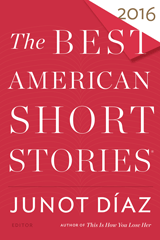
From The Best American Short Stories 2016. Used with permission of Houghton Mifflin Harcourt. Introduction copyright © 2016 by Junot Díaz.
Junot Díaz
Pulitzer Prize–winner Junot Díaz's first book, Drown, established him as a major new writer with "the dispassionate eye of a journalist and the tongue of a poet" (Newsweek). His first novel, The Brief Wondrous Life of Oscar Wao, was named #1 Fiction Book of the Year by Time magazine and spent more than one hundred weeks on the New York Times bestseller list, establishing itself—with more than a million copies in print—as a modern classic. In addition to the Pulitzer, Díaz has won a host of major awards and prizes, including the National Book Critics Circle Award, the PEN/Malamud Award, the PEN/O. Henry Prize, the Dayton Literary Peace Prize, and the Anisfield-Wolf Award.









